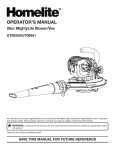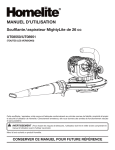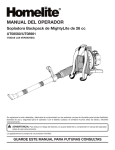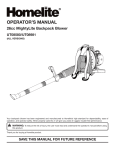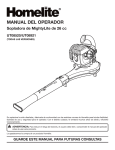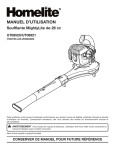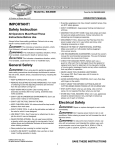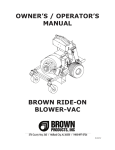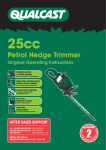Download Qualcast 30cc Operating instructions
Transcript
30cc Petrol Grass Trimmer Original Operating Instructions EASY PULL STARTING SYSTEM WITH ROTOCHOKE. Quick and easy to start. 43CM GRASS TRIMMING CUTTING WIDTH. Large diameter for fast and easy trimming. POWERFUL 30CC 2 STROKE PETROL ENGINE. Ideal for medium to large gardens. TWIN-LINE BUMP-FEED SPOOL. Automatic line feed for continuous trimming. ADJUSTABLE FRONT HANDLE AND CARRY STRAP. For greater control and comfort. AFTER SALES SUPPORT UK / IRELAND HELPLINE NO 0151 6491500 REP. IRELAND HELPLINE NO 1890 946244 WEB SUPPORT www.einhell-uk.co.uk MODEL NUMBER: HQ-PT 3043 HOMEBASE ARTICLE NUMBER: 346140 Contents 03. Safety Guide 06. Assembly and Parts list 12. Getting Started 14. Operation 19. Trouble Shooting 22. Declaration of Conformity 23. Guarantee Certificate 02 Helpline No. UK 0151 649 1500 / IRE 189 094 6244 1 2 3 4 5 Explanation of the information signs on the equipment: 1. Warning! 2. R ead the instructions for use before operating the equipment. 3. W ear safety goggles, a face guard and ear defenders. 4. Wear sturdy, non-slip footwear. 5. Wear safety gloves. 6. Protect the equipment from rain and damp. 7. Be careful of objects being thrown out! 8. A lways switch off the equipment and pull out the spark boot plug before carrying out any maintenance work. 9. A ll bystanders must be kept at least 15 m from the equipment. 10. The tool continues to rotate! 11. Caution: Hot parts. Keep your distance. 6 7 8 15 m 9 10 11 Helpline No. UK 0151 649 1500 / IRE 189 094 6244 03 Safety Information Handling 1. R ead the instructions with due care. Familiarize yourself with the settings and proper operation of the machine. 2. N ever allow children or other persons who are not familiar with the operating instructions to use the petrol grass trimmer. 3. N ever mow in the direct vicinity of persons especially children - or animals. Warning: Maintain a safety distance of 15m. If approached, switch off the appliance immediately. Always keep in mind that the machine operator or user is responsible for accidents involving other persons and/or their property. 1. Wear close fitting, tough work clothing that will provide protection, such as long slacks or trousers, protective footware, heavy duty work gloves, hard hat, a safety face shield, or safety glasses for eye protection and a good grade of ear defenders or other sound barriers for hearing protection. 2. Store in a safe place. Open fuel cap slowly to release any pressure which may have formed in fuel tank. To prevent a fire hazard, move at least 10 feet (3 meters) from fueling area before starting. 3. Turn unit off before setting it down. 4. Always hold unit firmly with both hands, the thumb and fingers encircling the handles. 5. Keep all screws and fasteners tight. Never operate your equipment when it is improperly adjusted or not completely and securely assembled. 6. Keep handles dry, clean and free of fuel mixture. 7. Keep the line spool as close to ground as practical. Avoid hitting small objects with the line spool. When cutting on a slope, stand below stringhead. NEVER cut or trim on a hill or slope, etc. if there is the slightest chance of slipping, sliding or losing firm footing. 8. Check the area you will be trimming for debris that may be struck or thrown during operation. 9. Keep all parts of your body and clothing away from the line spool when starting or running engine. Before starting the engine, make sure the line spool will not come in contact with any obstructions. 10. Stop the engine before examining cutting line. 11. Store equipment away from possible flammable materials, such as gas-powered water heaters, clothes dryers, or oil-fired furnaces, portable heaters, etc. 12. Always keep the safety guard, the line spool, and engine free of debris build-up. 13. Operation of equipment should always be restricted to mature and properly instructed individuals. 14. If unfamiliar with trimming techniques, practice the procedures with engine in “OFF” position. 15. Always clear work area of debris such as cans, bottles, rocks, etc. Striking objects can cause serious injury to operator or Preliminary measures 1. A lways wear sturdy, non-slip footwear and long trousers when operating the machine. Never operate the machine barefoot or in sandals. 2. C heck the grounds on which the machine will be used and remove all objects that could be caught up and violently flung out. 3.W arning: Petrol is highly flammable! • Only store petrol in containers designed to hold petroleum-based liquids. • Only refuel out in the open and do not smoke during the refueling process. • Always refuel before starting the engine. Do not open fuel tank cap and do not refuel when the engine is running or when the grass trimmer is hot. • If petrol has overflowed, do not under any circumstances attempt to start the engine. Instead, remove the machine from the affected area. Avoid starting the engine until the petrol fumes have completely evaporated. • For safety reasons, the petrol tank and other tank closures must be replaced if they are damaged. 4. R eplace defective exhausts. 5. B efore using the petrol grass trimmer, visually inspect it to ensure that the mounting bolts and the entire cutting apparatus are in good working order (i.e. not worn out or damaged). To prevent any imbalance, replace worn out or damaged mounting bolts as a set only (if applicable). 04 Helpline No. UK 0151 649 1500 / IRE 189 094 6244 bystanders and also damage equipment. If an object is hit accidentally, turn the engine off immediately and examine the equipment. Never operate unit with damaged or defective equipment. 16. Always trim or cut at high engine speeds. Do not run engine slowly at start or during trimming operations. 17. Do not use equipment for purposes other than trimming or mowing weeds. 18. Never raise the line spool above knee height during operation. 19. Do not operate unit with other people or animals in the immediate vicinity. Allow a minimum of 50 feet (15 meters) between operator and other people and animals when trimming or mowing. Allow a distance of 100 feet (30 meters) between operator and other people and animals when operating the petrol grass trimmer. 20. If operating on a slope, stand below the cutting attachment. Do not operate on a slope or hilly incline if there is the slightest chance of slipping or losing your footing. 8. D O NOT OPERATE UNIT FOR PROLONGED PERIODS. Rest periodically. 9. D O NOT OPERATE UNIT WHILE UNDER THE INFLUENCE OF ALCOHOL OR DRUGS. 10. D O NOT OPERATE UNIT UNLESS SAFETY GUARD IS INSTALLED AND IN GOOD CONDITION. 11. D O NOT ADD, REMOVE OR ALTER ANY COMPONENTS OF THIS PRODUCT. Doing so could cause personal injury and/or damage the unit voiding the warranty. 12. D O NOT operate your unit near or around flammable liquids or gases whether in or out of doors. An explosion and/or fire may result. 13. D O NOT USE ANY OTHER CUTTING TOOLS. For your own safety only use the accessories and additional equipment specified in the operating manual. The use of tools or accessories other than those recommended in this operating manual may place you in danger of personal injury. Additional instructions 1. D O NOT USE ANY OTHER FUEL other than that recommended in your manual. Always follow instructions in the Fuel and Oil section of this manual. Never use petrol unless it is properly mixed with 2-stroke engine oil. Permanent damage to engine will result, voiding manufacturer’s warranty. 2. D O NOT SMOKE while refueling or operating equipment. 3. D O NOT OPERATE UNIT WITHOUT AN EXHAUST and properly installed exhaust shield. 4. D O NOT TOUCH or let your hands or body come in contact with the exhaust. Hold unit with thumbs and fingers encircling the handles. 5. D O NOT OPERATE UNIT IN AWKWARD POSITIONS, off balance, outstretched arms, or one-handed. Always use two hands when operating unit with thumbs and fingers encircling the handles. 6. D O NOT RAISE THE LINE SPOOL above ground level while unit is operating. Injury to operator could result. 7. D O NOT USE UNIT FOR ANY PURPOSES OTHER than trimming lawn or garden areas. Helpline No. UK 0151 649 1500 / IRE 189 094 6244 05 A B 06 C Helpline No. UK 0151 649 1500 / IRE 189 094 6244 D E F1 F2 G G1 Helpline No. UK 0151 649 1500 / IRE 189 094 6244 07 08 G2 G3 H H1 H2 I Helpline No. UK 0151 649 1500 / IRE 189 094 6244 J1 J2 K1 K2 L M1 Helpline No. UK 0151 649 1500 / IRE 189 094 6244 09 10 M2 M3 M4 N1 N2 N3 Helpline No. UK 0151 649 1500 / IRE 189 094 6244 N4 N5 N6 N7 O1 O2 Helpline No. UK 0151 649 1500 / IRE 189 094 6244 11 Important! When using the equipment, safety precautions must be observed to avoid injuries and damage.Please read the complete operating instructions and safety regulations with due care. Keep this manual in a safe place, so that the information is available at all times. If you give the equipment to any other person, hand over these operating instructions and safety regulations as well. We cannot accept any liability for damage or accidents which arise due to a failure to follow these instructions and the safety instructions. 1.Safety information CAUTION! Read all safety regulations and instructions. Any errors made in following the safety regulations and instructions may result in an electric shock, fire and/or serious injury. Keep all safety regulations and instructions in a safe place for future use. Safety devices When working with the equipment, the appropriate safety guard must be fitted to prevent objects being thrown out by the equipment. The integrated blade in the safety guard automatically cuts the line to the optimum length. 2.Machine description and items supplied (Fig. A – C) 1. Cutting head 2. Cutting line 3. Safety guard with screw, washer and locknut 4. Long handle with drive shaft 5. Additional handle 6. Engine switch “ON/OFF” (1/0) 7. Throttle lever “release” 8. Throttle lever 9. Fastening eyelet 10. Choke (swivelling) 11. Starter cable 12. Spark plug boot 13. Air filter housing cover 14. Petrol tank 15. Housing for engine cooler and starter 16. Fuel pump “primer” 17. Carrying strap 18. Connecting piece for long handle 19. Fuel mixture bottle 20. Spark plug wrench 21. 2-stroke oil 3.Proper use The machine is designed for cutting lawns and grassed areas. Important. Due to the high risk of bodily injury to the user, the petrol trimmer must not be used to carry out the following work: to clean (suck up) dirt and debris off walkways, or to chop up tree or hedge clippings. Moreover, the petrol trimmer may not be used to level out high areas such as molehills. For safety reasons, the petrol trimmer may not be used as a drive unit for other work tools or toolkits of any kind. The machine is to be used only for its prescribed purpose. Any other use is deemed to be a case of misuse. The user / operator will be liable for any damage or injuries of any kind caused as a result of this. Please note that our equipment has not been designed for use in commercial, trade or industrial applications. Our warranty will be voided if the machine is used in commercial, trade or industrial businesses or for equivalent purposes. 12 Helpline No. UK 0151 649 1500 / IRE 189 094 6244 4.Technical data Engine type: 2-stroke engine, air-cooled, chrome cylinder Engine power (max.): 0.76 kW/1.03 hp Displacement: 29.7 cc Idle speed of engine: 2900 rpm Max. engine speed: 11000 rpm Max. twin line speed: 8000 rpm Ignition: Electronic Drive: Centrifugal clutch Weight (with empty tank): 5.8 kg Long handle length: 135 cm Cutting circle diameter of line: Ø 43 cm Cutting line length: 5.0 m Cutting line diameter: 2.0 mm Tank capacity: 0.6 l Spark plug: Vibration ahv rear handle: Uncertainty of vibration level: LpA sound pressure level: LWA sound power level: Torch L8RTC 9.319 m/s2 3.7m/s2 92 dB (A) 112 dB (A) Uncertainty sound level: 1dB Sound and vibration were measured in accordance with EN ISO 27917, 10884/7916. 5.Before starting the equipment 5.1 Assembly 5.1.1 Assembly of the long handle (Fig. D-E) Remove the transport guard cap from the lower long handle. Slacken the star grip screw (Fig. D/Item A) on the connecting piece on the upper long handle (Fig. D/Item B). Carefully slide the lower long handle (Fig. D/ Item C) into the connecting piece on the upper long handle. When doing so, take care to ensure that the drive shafts on the insides of the long handles slide into each other (turn the spool head gently, if required) and that the lock on the lower long handle (Fig. E/Item D) latches securely in the connecting piece. Now retighten the star grip screw (Fig. D/Item A). To dismantle, proceed in reverse order. 5.1.2 Fitting the guard hood (Fig. F1–F2) Attach the safety guard to the lower long handle (Fig. F1). Screw the safety guard tightly in position using the screw, washer and locknut (Fig. F2). 5.1.3 Fitting the carrying strap (Fig. G) The carrying strap is intended to help you work safely and ergonomically with the petrol grass trimmer. Hook the carrying strap into the fastening eyelet (Fig. G/Item 9). Check that all moving parts move smoothly before you start using the machine. Check that all screws are securely fastened and also check all the safety devices. 5.1.4 Fitting the additional handle (Fig. G1–G3) Slacken the wing nut on the fastening screw on the handle (Fig. G1/Item 1). Remove the nut and the fastening screw (Fig. G1/Item 3) from the handle clip the additional handle over the long shaft (Fig. G2). Insert the fastening screw through the additional handle and then clamp tightly by fitting the wing nut (Fig. G3). 5.2 Setting the cutting height • Slip the shoulder strap (Fig. B/Item 17) over the left shoulder. • Set the length of the shoulder strap in such a way that the cutting head runs parallel to the ground. In order to establish the optimum length of the shoulder strap, you should then make a few swinging movements without starting the engine (Fig. I). Please note: Always use the shoulder strap when using the machine. Attach the strap as soon as you have started the engine and the engine is running in idle mode. Switch off the engine before you take off the shoulder strap. Check the machine for the following each time before use: • That there are no leaks in the fuel system • That the cutting unit and all safety devices are in perfect condition • That all screws are securely fastened Helpline No. UK 0151 649 1500 / IRE 189 094 6244 13 5.3 Fuel and oil Recommended fuels Use only a mixture of normal unleaded petrol and special 2-stroke engine oil. Mix the fuel mixture as indicated on the fuel mixing table. Please note: Do not use a fuel mixture which has been kept for longer than 90 days. Please note: Do not use 2-stroke oil with a recommended mixing ration of 100:1. If inadequate lubrication causes engine damage, the manufacturer’s engine warranty will be voided. Please note: Only use containers designed and approved for the purpose to transport and store fuel. Pour the correct quantities of petrol and 2-stroke oil into the mixing bottle (Fig. C/Item 19 see scale printed on the bottle). Then shake the bottle well. 5.4 Fuel mixture table Mixing procedure: 40 parts petrol to 1 part oil Petrol 1 litres 5 litres 2-stroke oil 25 ml 125 ml 6.Operation Important. A blade (Fig. L/ Item F) on the underside of the safety guard automatically cuts the cutting line to the optimum length. 6.1 Starting the engine when cold Fill the tank with the required amount of oil/ petrol mix. See “Fuel and oil”. 1. Set the machine down on a hard, level surface. 2. Set the choke lever (Fig. A/Item 10) to „ “. 3. Press the fuel pump (primer) (Fig H/Item 16) 10 times. 4. Switch the ON/OFF switch (Fig. A/Item 6) to “I”. 5. Hold the appliance firmly in one hand by the handle, above the throttle lock (Fig. H1). 6. With the other hand pull out the starter cable (Fig. A/Item 11) until you feel it starts to resist. Then tug sharply on the starter cable 10 times. 14 Important: Never allow the starter cable to snap back. This may damage the machine. Important: The cutting tool starts to operate when the engine is started. 7. If the motor has already been started, let it warm up for about 30 seconds. As soon as you press the throttle lock (Fig. A/Item 7) and use the throttle (Fig. A/Item 8), the swivelling choke automatically jumps to Run „ “ (See Fig. H2). If the engine does not start up, repeat steps 1-7 above. Please note: If the engine does not start up even after several attempts, read the section “Engine Troubleshooting”. Please note: Always pull the starter cable out in a straight line. If it is pulled out at an angle, then friction will occur on the eyelet. As a result of this friction, the cable will become frayed and will wear away faster. Always hold the starter handle when the cable retracts. Never allow the cable to snap back when it has been pulled out. This may also cause damage to the cable or the starter. 6.2 Starting the engine when warm (if the equipment has not been switched off for more than 15 – 20 minutes) 1. Set the equipment down on a hard, level surface. 2. Switch the ON/OFF switch to “I”. 3. Fully depress the throttle lever (See Fig. H2). 4. Hold the equipment firmly and pull out the starter cable until you feel it start to resist. Then tug sharply on the starter cable. The equipment should start after 1 - 2 pulls. If the equipment does not start after 6 pulls, repeat steps 1 – 7 of the procedure for starting the engine from cold. Helpline No. UK 0151 649 1500 / IRE 189 094 6244 6.3 Switching off the engine Emergency Stop procedure: If it becomes necessary to stop the machine immediately, set the ON/OFF switch to “Stop” or “0”. Normal procedure: Let go of the throttle lever and wait until the engine has changed to idling speed. Then set the ON/OFF switch to “Stop” or “0”. 6.4 Practical tips Practice all operating techniques with the engine switched off before you start to use the machine. EXTENDING THE CUTTING LINE WARNING: Do not use any kind of metal wire or metal wire encased in plastic in the cutting head. This may cause serious injuries to the user. To extend the cutting line run the motor at full speed and tap (“BUMP”) the cutting head on the ground. This will automatically extend the line. The blade on the safety shield will cut the line to the appropriate length (Fig. M1). Caution: Remove all grass and weed remains at regular intervals to prevent the shaft tube overheating. Grass and weed remains become trapped under the safety guard (Fig. M2) and they prevent the shaft tube receiving adequate ventilation. Remove the remains carefully using a screwdriver or the like. DIFFERENT CUTTING METHODS If the machine is correctly assembled with the safety hood and cutting head it will cut weeds and long grass in places with difficult access, for example along fences, walls and foundations and also around trees. It can also be used for mowing work to remove vegetation to allow the better preparation of a garden or to clear a certain area down to the soil. TRIMMING / MOWING Swing the trimmer in a side to side motion. Always keep the cutting head parallel to the ground. Check the site and decide what cutting height you require. Guide and hold the cutting head at the required height to ensure that you cut evenly (Fig. M3). LOWER TRIMMING Hold the trimmer right in front of you at a slight angle so that the underside of the cutter head is above the ground and the line strikes the correct target. Always cut away from yourself. Never draw the trimmer towards yourself. CUTTING ALONG FENCES / FOUNDATIONS When cutting approach wire mesh fences, lath fences, natural stone walls and foundations slowly so that you can cut close to them without striking the obstacle with the line. If, for example, the line strikes stones, stone walls or foundations, it will wear or fray. If the line strikes wire fencing it will break. TRIMMING AROUND TREES When trimming around tree trunks, approach slowly so that the line does not strike the bark. Walk around the tree, cutting from left to right. Approach grass or weeds with the tip of the line and tilt the cutting head forwards slightly. WARNING: Take extreme care during mowing work. When doing such work keep a distance of 30 meters between yourself and other people or animals. MOWING For mowing you should cut all the vegetation down to the ground. To do this, set the cutting head at an angle of 30° to the right. Place the handle in the required position. Remember the increased risk of injury to the user, watchers and animals and the danger of damaging other items due to objects (for example stones) being thrown out (Fig. M4). PLEASE NOTE: Even if it is used carefully, cutting around foundations, stone or concrete walls, etc. will result in the line suffering more than normal wear. Helpline No. UK 0151 649 1500 / IRE 189 094 6244 15 WARNING: Do not remove any objects from footpaths, etc. using the trimmer. The trimmer is a powerful tool and can throw small stones and other objects a distance of 15 meters or more, causing injuries and damage to cars, houses and windows. (Fig. N4). • Wind the line with tension in a clockwise direction as shown in the illustration (Fig. N5), with the two halves being separated by the spool divider. Wind up all of the line down to the last 15cm of each end. 7. Cleaning, maintenance, storage, transport and ordering of spare parts 3. F asten each of the ends of the line in a slot (Fig. N6/Item L) on the opposite side of the spool. 4. F it the spring (Fig. N3/Item I). on the inside of the spool and thread each of the ends of the line through one of the eyelets in the spool holder (Fig. N3/Item K). 5. Insert the spool in the spool holder. Make sure that the spring slides over the spindle and does not get stuck. 6. P ress the spool into the spool holder with your hand and use your other hand to fasten the retainer knob tightly (Fig. N7). 7. G ive each end of the line a strong pull to pull the line out of the slots. 8. C ut off all excess line to reduce it to approx. 13 cm. This will reduce the load on the engine when starting up and warming up. 7.1 Cleaning • Keep all safety devices, air vents and the motor housing free of dirt and dust as far as possible. Wipe the equipment with a clean cloth or using compressed air at low pressure (ensure to blow it in a safe direction). • We recommend that you clean the device immediately each time you have finished using it. • Clean the equipment regularly with a moist cloth and some soft soap. Do not use cleaning agents or solvents; these could attack the plastic parts of the equipment. Ensure that no water can seep into the device. 7.2. Maintenance Always switch off the machine and pull out the spark boot plug before carrying out any maintenance work. 7.2.1 Replacing the line spool / cutting line 1. Unscrew the retainer knob (Fig. N1/Item G) in a counter-clockwise direction and remove (Fig. N1/N2). 2. Remove the spool (Fig. N3/Item H) and the spring (Fig. N3/Item I) from the spindle (Fig. N3/Item J). The following steps only have to be carried out if only the line and not the entire spindle requires replacing: • Remove the remaining cutting line from the spool. • Hold the two halves of a new cutting line together in the middle and place the loop in one of the slots on the spool divider 16 7.2.2 Maintenance of the air filter (Fig. J1-J2) Soiled air filters reduce the engine output by preventing the air reaching the carburettor. Regular checks are therefore essential. The air filter should be checked after every 25 hours of use and cleaned if necessary. If the air contains a lot of dust, the air filter should be checked more frequently. 1. Remove the air filter cover (Fig.J1-J2) 2. Remove the filter element. 3. C lean the filter element by tapping it or blowing it. 4. Assemble in reverse order. Please note: Never clean the air filter with petrol or inflammable solvents. Clean the air filter with compressed air or by tapping it. 7.2.3 Maintenance of the spark plug (Fig. K1-K2) Spark plug gap = 0,6 mm. Tighten the spark plug with a torque of 12-15 Nm. Helpline No. UK 0151 649 1500 / IRE 189 094 6244 Check the spark plug for dirt and grime after 50 hours of operation and if necessary clean it with a copper wire brush. Thereafter service the spark plug after every 50 hours of operation. 1. Pull off the spark plug boot (Fig. K1) by twisting. 2. Remove the spark plug (Fig. K2) with the supplied spark plug wrench. 3. Assemble in reverse order. 7.2.4 Grinding the safety guard blade The safety guard blade (Fig. L/Item F) can become blunt over time. Clamp the blade in a vise. Sharpen the blade with a flat file and make sure that the angle of the cutting edge is not altered in the process. File in one direction only. 7.2.5 Carburettor settings Important. Settings on the carburettor may only be made by an authorised petrol repair agent. Setting the throttle cable: If the maximum speed of the machine falls over time and you have ruled our all the other causes listed in section 9 Troubleshooting, it may be necessary to adjust the throttle cable. First of all check whether the carburettor opens fully when the throttle lever is pressed fully. This is the case if the carburetor slide (Fig. O1/Item 1) rests against the stop (Fig. O1/Item 2) when the throttle is fully open. Figure 16 shows the correct setting. If the carburetor slide does not touch the stop, it must be adjusted. The following work is required to adjust the throttle cable: • Undo the lock nut (Fig. O2/Item 3) a few turns. • Undo the adjusting screw (Fig. O2/Item 4) until the carburettor slide rests against the stop when the throttle is fully open, as shown in Figure O1. • Retighten the lock nut. Setting the idling speed: Important. Set the idling speed when the machine is warm. If the engine stalls when the throttle is not pressed and you have ruled out all the other causes listed in section 9 Troubleshooting, the idling speed must be adjusted. To do this turn the idling speed screw (Fig. O2/Item 5) clockwise until the machine runs smoothly at idling speed. If the idling speed is so fast that the cutting tool turns as well, it has to be reduced by turning the idling speed screw counter-clockwise (Fig. O2/ Item 5) for as long as is required for the cutting tool to stop turning as well. Helpline No. UK 0151 649 1500 / IRE 189 094 6244 17 7.3 Storage Please note: If you fail to follow these instructions correctly, deposits may form on the interior of the carburetor which may result in the engine being more difficult to start or the machine suffering permanent damage. 1. Carry out all of the maintenance work. 2. Drain the fuel out of the tank (You can use a plastic petrol pump for this purpose, which can be bought via our HELPLINE 0151 649 1500). 3. When the fuel has been drained, start the engine. 4. Allow the engine to run at idling speed until it stops. This will clean the remainder of the fuel out of the carburetor. 5. Leave the machine to cool (approx. 5 minutes). 6. Remove the spark plug. 7. Place a teaspoon full of 2-stroke engine oil into the combustion chamber. Pull the starter cable several times carefully to wet the internal components with the oil. Fit the spark plug again. 8. Clean the exterior housing of the machine. 9. Store the machine in a cold, dry place where it is out of the reach of ignition sources and inflammable substances. Fertilizers and other chemical garden products often contain substances that accelerate the rate of corrosion of metals. Do not store the machine on or near fertilizers or other chemicals. 7.4 Transport To transport the machine, first empty the petrol tank as described in section 2 in the section entitled “Storage”. Clean coarse dirt off the machine with a brush or hand brush. Dismantle the long handle as described 5.1.1 7.5 Ordering replacement parts Please quote the following data when ordering replacement parts: • Type of model/Machine (HQ-PT 3043) • Article number of the machine (34.018.72) • Identification number of the machine (11010) • Replacement part number of the part required For our latest prices and information please go to www.einhell-uk.co.uk 8. Disposal and recycling The unit is supplied in packaging to prevent its being damaged in transit. This packaging is raw material and can therefore be reused or can be returned to the raw material system. The unit and its accessories are made of various types of material, such as metal and plastic. Defective components must be disposed of as special waste. Ask your dealer or your local council. Restarting 1. Remove the spark plug. 2. P ull the starter cable several times to clean the oil residue out of the combustion chamber. 3. C lean the spark plug contacts or fit a new spark plug. 4. F ill the tank. See the section entitled Fuel and oil. 5. C omplete steps 1-7 described under the point entitled “Starting the engine from cold”. 18 Helpline No. UK 0151 649 1500 / IRE 189 094 6244 9. Troubleshooting FAULT POSSIBLE CAUSES TROUBLESHOOTING The machine does not start. -Correct starting procedure not followed. -Sooted or damp spark plug. -Incorrect carburettor setting. -Follow the instructions for starting. -Clean the spark plug or replace it with a new one. -Contact Helpline: 0151 649 1500 The machine starts but does not develop its full output. -Incorrect choke lever setting. -Soiled air filter. -Incorrect carburettor setting. -Set choke lever to -Incorrect electrode gap on the spark plug. -Clean the spark plug and adjust the electrode gap or fit a new spark plug. -Contact Helpline: 0151 649 1500 The engine does not run smoothly -Incorrect carburettor setting. Engine smokes excessively - Incorrect fuel mix. -Incorrect carburettor setting. -Clean the air filter. -Contact Helpline: 0151 649 1500 -Use the correct fuel mix (see fuel mixing table). -Contact Helpline: 0151 649 1500 Helpline No. UK 0151 649 1500 / IRE 189 094 6244 19 Please adhere to the following maintenance periods in order to ensure a failure-free operation. Important! Fill in engine oil and fuel before starting up the engine for the first . time. (2-STROKE) Before each use After an operating period of 20 hours After an operating period of 50 hours After an operating period of 100 hours After an operating period of 300 hours Change the Check the air filter filter element if X Clean the air filter necessary X Clean the petrol filter Visual inspection of the unit Clean the spark plug X X Distance: 0.6mm, Replace if necessary Check and readjust the carburetor's throttle valve X* Clean the cylinder head X* Set the valve clearance X* Important: The positions marked with ”X” should only be carried out by a repair agent. 20 Helpline No. UK 0151 649 1500 / IRE 189 094 6244 Notes Helpline No. UK 0151 649 1500 / IRE 189 094 6244 21






















